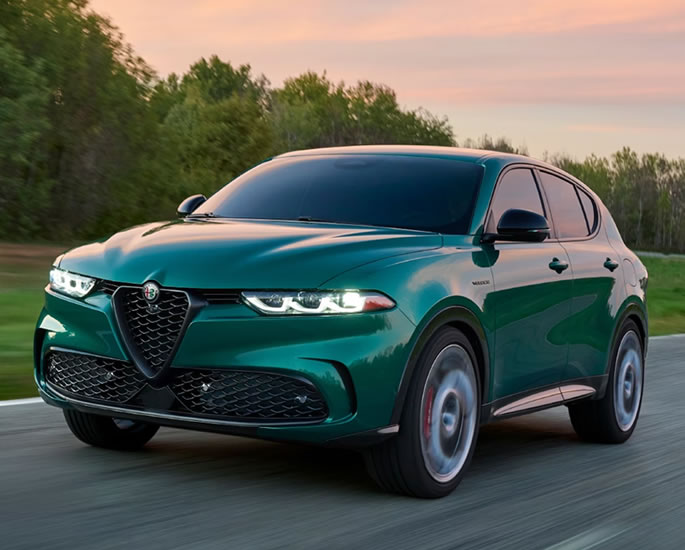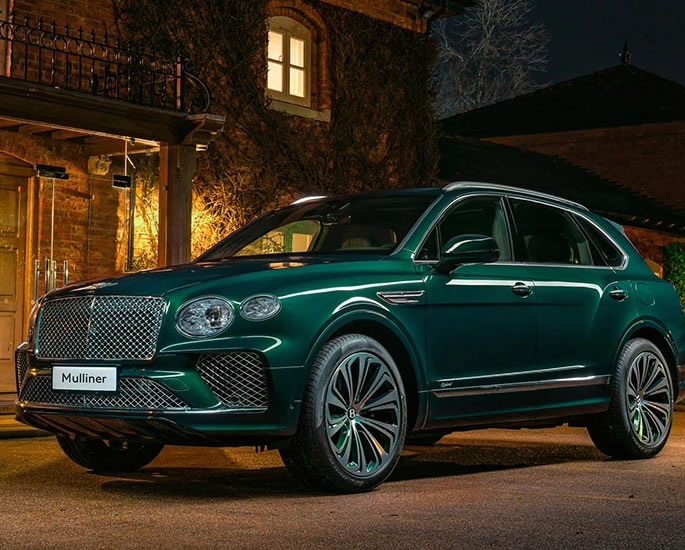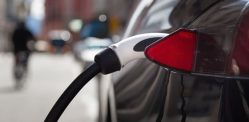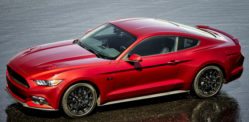This is around three years earlier than sister brands
Rishi Sunak announced that the ban on new petrol and diesel car sales would be pushed back from 2030 to 2035.
The decision divided car makers, with Ford saying it would “undermine” the move to electric.
Ford’s UK chair Lisa Brankin said the original 2030 target “is a vital catalyst to accelerate Ford into a cleaner future”, adding the company had already invested £430 million in upgrading its UK plants to produce electric cars.
On the other hand, Toyota welcomed the announcement, adding it recognised that “all low emission and affordable technologies can have a role to play in a pragmatic vehicle transition”.
Meanwhile, the UK’s motor industry body, the Society of Motor Manufacturers and Traders (SMMT), raised concerns that the delay could put off drivers from switching to electric vehicles.
Despite the Prime Minister’s announcement, some manufacturers are committed to selling only electric vehicles from 2030.
We look at the car brands that currently do not intend to have any petrol or diesel cars in UK showrooms from 2030.
Alfa Romeo

When will it stop selling petrol and diesel cars? – 2027
From 2025, Alfa Romeo says it plans to only launch pure-electric models, and by 2027 its entire line-up in Europe is expected to be EVs.
This is around three years earlier than sister brands under the Stellantis group banner.
It currently only has one ‘electrified’ car on sale – the plug-in hybrid Tonale.
Its first fully electric Alfa is expected to be unveiled in 2024 and is likely to be called the Brennero.
Bentley

When will it stop selling petrol and diesel cars? – 2030
Bentley was one of the first brands to announce its move to electric, announcing in 2020 that it would be a fully-fledged electric car manufacturer by 2030.
The first all-electric model is due in 2025.
This is a huge shift for the brand, which will end its 111-year history of cars with petrol engines.
Adrian Hallmark, Bentley’s chairman and chief executive, said it was time for “profound change” for the motor maker:
“We are on a mission. We need to change everything. But our cars in the future will look as inspirational and glorious as they do today.”
Citroen

When will it stop selling petrol and diesel cars? – 2030
Like other Stellantis group car makers, Citroen will only launch fully electric models from 2026 onwards.
While Citroen hasn’t clarified when it will stop selling EVs, it will likely be by 2030 to match the intentions of its parent group.
It currently offers five electric cars in its global model line-up – the e-C4, e-C4 X, e-Spacetourer, e-Berlingo and the dinky Ami quadricycle.
Cupra

When will it stop selling petrol and diesel cars? – 2030
Cupra – the sporty spin-off brand of Seat – has one zero-emission vehicle on sale at the moment, which is the Born hatchback.
The Born is essentially a re-badged Volkswagen ID.3.
But in 2021 CEO Wayne Griffiths said the company has “the ambition to become a fully electric brand by 2030”.
DS Automobiles

When will it stop selling petrol and diesel cars? – 2024
DS Automobile bosses confirmed it will be a fully-electric brand from 2024.
In 2021, Béatrice Foucher, CEO at DS Automobiles, said:
“The car industry is experiencing a change whose breadth and speed are unprecedented.
“As a pioneer, DS Automobiles has anticipated this move, with electrification at the centre of its strategy.”
“The next developments in legislation and the EV ecosystem provide opportunities that we want to offer to our customers who already like our electrified range.
“I took the decision to speed up the development to create a new 100 per cent electric art of travel, desirable in terms of enjoyment and remarkable in terms of quality and performance; a new art of travel, steadfastly high tech and still just as refined.
“It is a daring plan that will take shape from 2024.”
Fiat

When will it stop selling petrol and diesel cars? – 2030
In 2021, Fiat bosses confirmed it will say goodbye to petrol and diesel engines by 2030.
The brand will begin to phase out all combustion-engined models from its global line-up from 2025 and by the end of the decade will no longer sell passenger cars with a petrol or diesel engine under the bonnet.
Fiat boss Olivier Francois said: “Between 2025 and 2030, our product line-up will gradually become electric only.
“This will be a radical change for Fiat.”
Fiat’s biggest seller is the 500, which has already gone electric.
Ford

When will it stop selling petrol and diesel cars? – 2030
Ford announced in February 2021 that its entire passenger vehicle line-up in Europe will be electric or plug-in hybrid by mid-2026.
And in 2030, Ford will be all-electric only.
Its first electric-only car is the impressive Mustang Mach-E which will be joined shortly by the new Explorer SUV. And Ford has already begun sales of electric versions of its hugely popular Transit vans.
The manufacturer has also confirmed that it will utilise a strategic alliance formed with Volkswagen AG in 2019 in the early phase of its all-electric onslaught.
Ford will use its German partner’s MEB electric vehicle platform to build more affordable models at its Cologne factory.
Genesis

When will it stop selling petrol and diesel cars? – 2030
Genesis is the luxury division of Hyundai.
It has recently broken into Europe with a range of hybrid and electric cars.
The brand stated that from 2025, it will only be releasing battery-powered models and from 2030, it only sell EVs in Europe.
Jaguar

When will it stop selling petrol and diesel cars? – 2025
Jaguar was the first premium car maker to compete with Tesla in 2018 with the launch of the I-Pace.
It still remains Jaguar’s only EV on sale. However, this will change in the next two years.
In February 2021, bosses outlined Jaguar’s intention to be an “all-electric luxury brand” from 2025.
The move will see Jaguar completely axe the petrol engines that made its name within the next three years.
The first next-generation EV will be shown in 2024 and is confirmed as a £100,000 four-door grand tourer with the ‘wow factor’.
Jeep

When will it stop selling petrol and diesel cars? – 2030
The Avenger is Jeep’s first all-electric model and it will be joined by other battery-powered models, with the company confirming four new electric cars by 2025.
By 2030, bosses say 100% of sales in Europe will be electric.
In the United States, around 50% of sales by the end of the decade will be EVs.
Lexus

When will it stop selling petrol and diesel cars? – 2030
Lexus has lots of experience with hybrids but not so much with fully electric cars, with only two on sale.
But at the end of 2021, bosses outlined Lexus and Toyota’s plans to launch a total of 30 battery EVs by 2030.
Lexus, though, will have a tighter deadline for the end of the sale of petrol cars than its sister brand, aiming to sell only 100% battery electric cars in major markets by 2030.
MINI

When will it stop selling petrol and diesel cars? – 2030
It is confirmed that MINI will transform into a fully-electric brand by 2030.
It will launch its final new model with an internal combustion engine in 2025, hoping this will see half of all sales being electric cars by 2027.
At the 2023 Munich motor show, the car company unveiled its all-new MINI Electric hatchback and an all-electric version of the Countryman SUV.
MINI has also committed to manufacturing EVs in Britain with a fresh investment in its Oxford car factory.
Peugeot

When will it stop selling petrol and diesel cars? – 2030
As with other brands under the Stellantis banner, electrification is at the centre of Peugeot’s strategy.
It intends for 70% of worldwide sales to be electric in 2022 and will remove all petrol and diesel models from showrooms by the end of the decade.
In December 2021, Peugeot CEO Linda Jackson confirmed the manufacturer’s ambition to be an EV-only brand by 2030.
However, buyers outside of Europe will still be able to buy new petrol and diesel-powered Peugeots during the next decade.
Renault

When will it stop selling petrol and diesel cars? – 2030
Renault has outlined its intention to be an all-electric car brand in Europe from 2030.
CEO Luca de Meo said: “Renault will be 100 per cent electric in 2030 in Europe.”
This will see the acceleration of its previous plan to achieve 90% EV sales in the region by that date.
It has already confirmed the arrival of an all-electric Renault 5 and 6.
Rolls-Royce

When will it stop selling petrol and diesel cars? – 2030
Even luxury car makers like Rolls-Royce are preparing to switch to electric.
It has already unveiled its first zero-emission car, the £330,000 Spectre.
Bosses have confirmed that all models will be electric by 2030.
Chief executive Torsten Muller-Otvos, said:
“Over the past decade, I have been repeatedly asked, when will Rolls-Royce go electric? And when will you produce your first electric car?
“I answered with an unambiguous promise, ‘Rolls-Royce will go electric, starting this decade’. Today, I’m keeping my word.”
Vauxhall

When will it stop selling petrol and diesel cars? – 2028
Vauxhall appears to be one brand that has signalled its switch to EVs mostly as a result of direction from ministers.
On its website, it says: “The UK Government has banned the sale of petrol and diesel-powered new vehicles from 2030, and will only allow zero emissions-in-use vehicles from 2035.
“But we’re not waiting until then.
“From 2028, Vauxhall will only sell 100 per cent electric cars and vans, seven years ahead of the government deadline. We’re leading from the front with electric.”
In 2023, Vauxhall’s Ellesmere Port became the UK’s first EV-only manufacturing site.
Volvo

When will it stop selling petrol and diesel cars? – 2030
Volvo has already scrapped all diesel models from its showrooms and will do the same with petrol-powered cars by 2030.
The Swedish carmaker, which is owned by Hangzhou-based Zhejiang Geely Holding Group, says that 50% of its global sales should be fully electric cars by 2025 – and the other half hybrid models.
From 2025, it will release a pure-electric model every year until 2030 when it will banish petrol and hybrid drivetrains entirely and sell only EVs.
Rishi Sunak’s announcement means new petrol and diesel car sales will remain until 2035.
And while there is frustration over the changes, some car manufacturers remain committed to becoming electric-only by the original deadline of 2030.






























































